Last Updated: February 11, 2022
We have been hearing from a lot of people who are planning trips this winter. They are wondering what’s going on with Covid in Costa Rica and what to expect for the future. In this post, we’ll let you know how Covid vaccinations are going in Costa Rica. We’ll give current vaccination numbers and resources to stay up to date.
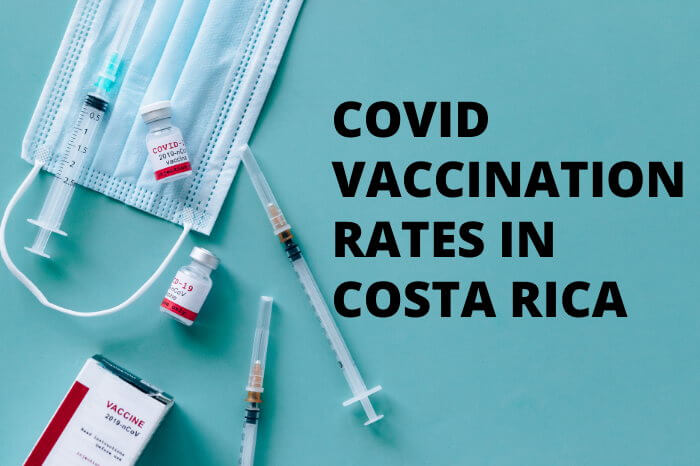
Covid in Costa Rica – Background
As of February 2022, Costa Rica’s Covid numbers are increasing again. New cases and hospitalizations were extremely low in October-December, but are going up again with the Omicron variant.
We have a whole post dedicated to Costa Rica’s Covid current numbers, Costa Rica and the Coronavirus. We update the article every day, Monday through Friday, when the government comes out with new data. You can refer to that article for more information.
Covid Vaccine Rollout in Costa Rica
The government started administering vaccines at the end of 2020 but didn’t start its public vaccination campaign until early 2021. The country was off to a somewhat slow start due to a lack of supply. Costa Rica didn’t start getting significant amounts of vaccine until mid-year.
Costa Rica has contracts with Pfizer-BioNTech and Astra Zeneca. It is also part of the COVAX alliance.
Costa Rica also has received donated vaccines from other countries such as the United States, Canada, Spain, and Austria.
The majority of the vaccine supply is Pfizer-BioNTech.
Priority Groups
The government created a priority system for Covid vaccinations due to the limited supply.
Group 1 is health care workers, first responders, and staff at nursing homes.
Group 2 is older adults (ages 58 and up).
Group 3 is people ages 16-57 with a preexisting condition/risk factor. These include hypertension, diabetes, heart disease, COPD, asthma, obesity, etc. [Note: Costa Rica later opened this up to starting at age 12 for children with preexisting conditions once the Pfizer vaccine was approved for kids.]
Group 4 is teachers and certain public employees.
Group 5 is the general population with no risk factors (everyone else).
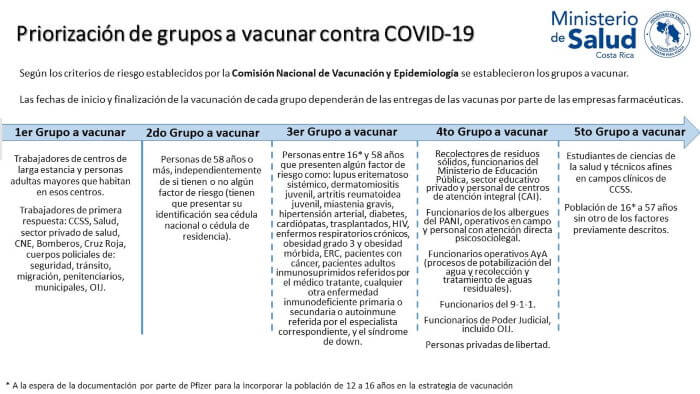
Within those groups, appointments were initially given based on age. So, for example, in Group 3, they started with ages 50-57 and didn’t do lower ages until they had a certain percentage of the older group vaccinated.
Delaying Second Shot
Costa Rica vaccinated Groups 1 and 2 following the standard recommended timeframe between doses (21 days).
However, starting with Group 3 (risk factors group), they spaced out doses by 12 weeks. The idea was to get more people one shot, similar to what some European countries have done.
Booster Shots
Costa Rica started administering third doses (booster shots) late in 2021.
Currently, they are giving boosters to anyone who had their last shot at least five months ago.
Current Vaccination Rates in Costa Rica
As of February 7, 2022, 79% of the total population has had at least one shot. 72% has had two shots. 12% has had a booster shot.
This is according to the Caja Costarricense de Seguro Social (CCSS) website. The CCSS is Costa Rica’s public healthcare system. It is in charge of administering the vaccine along with the Ministry of Health.
Among older adults (age 58+), 96.5% has had one shot, 96.1% has had two shots, and 62.1% has had a booster.
For ages 40-57, 94.4% has had one shot, 89.3% has had two shots, and 4.6% has had a booster.
For ages 20-39, 92.5% has had one shot, 82.5% has had two shots, and 3.1% has had a booster.
For ages 12-19, 91.7% has had one shot, 80.2% has had two shots, and 0.2% has had a booster.
Children Ages 5-11
Costa Rica started vaccinating children ages 5-11 in January 2022. They are starting with the older children first (age 11) and working down.
Currently, 16.4% of children ages 5-11 have had one dose and 2.7% has had a second dose. Second doses are being administered 21 days after the first dose.
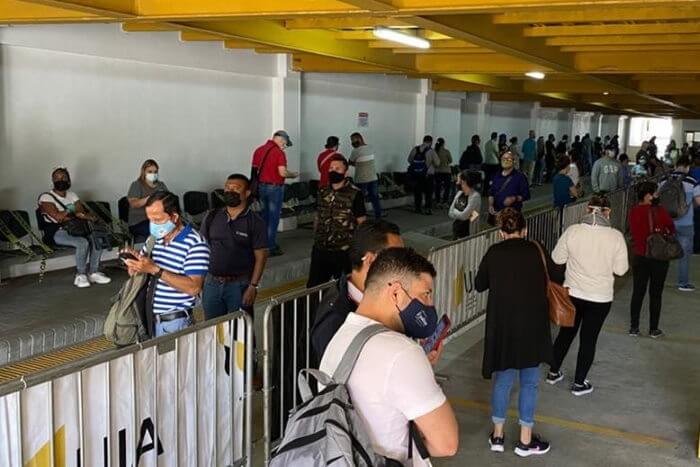
Background – Speeding up the Rollout
In July 2021, Costa Rica started receiving large vaccine shipments. At that point, it opened vaccination up to everyone age 40 and older.
It started with a mass vaccination effort. The goal was to apply 500,000 doses that the United States donated between July 16-25, 2021. Doses were still spaced out by 12 weeks, but anyone within that age group could get their first shot.
In the following weeks, they dropped it to 30 years old. Now, it is open to anyone ages 12 and up. An appointment is no longer needed. You can just show up at a local public clinic.
Importantly, in late August, they changed the time between doses to eight weeks for ages 30-57. This was because of the surge in the Delta variant and increase in hospitalizations.
What this meant is that many of those people in Group 5 (general population group) who got their first dose in late July or August were able to get the second shot in September or October. This is when full vaccination rates began increasing significantly.
Costa Rica did another big vaccination campaign in September. Local hospitals and clinics across the country were open 7 am-7 pm every day of the week.
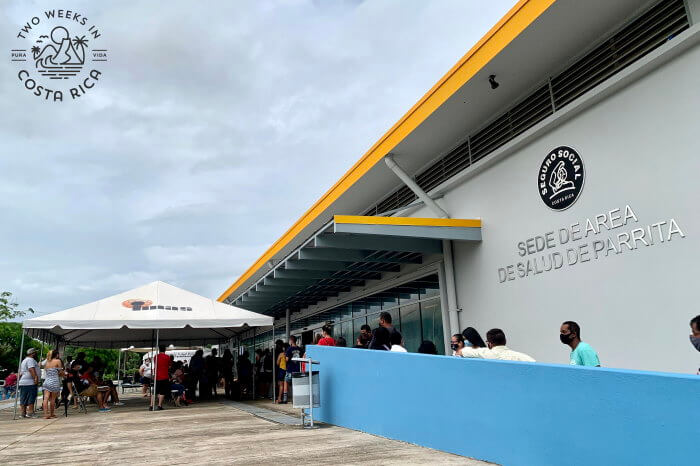
Staying Up to Date
We will update this post regularly with current vaccination numbers. But if you’d like to follow this day to day, the CCSS has updated information on their website.
Vaccine Hesitance
Although there is some vaccine hesitance in Costa Rica, overall, it is minimal. Costa Rica has one of the highest vaccination rates in the world in general. We expect it to have a high Covid vaccination rate as well.
The government is really pushing people to get vaccinated on the news and social media. They have been having mass vaccination campaigns in public spaces like malls and vaccinating by car in some areas, in an effort to get more people to come out.
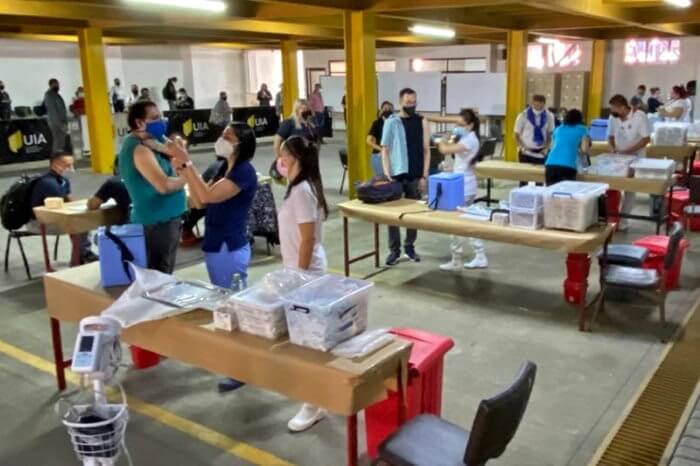
Covid Vaccination Requirements in Costa Rica
Tourists
Currently, anyone can travel to Costa Rica. If you are not fully vaccinated, you just need to purchase specific travel insurance that covers Covid.
For more information, check out our post, Traveling to Costa Rica During Covid-19: Entry Requirements, Protocols, and What to Expect.
Citizens and Residents
Covid vaccines are not specifically required for Costa Rican adult citizens or legal residents. However, in September, the government made the vaccine mandatory for all public employees as of October 15, 2021. Private employers may require it as well.
In addition, the government announced that a vaccine passport would begin on December 1. Currently there is litigation pending against this and the program is voluntary. From December 1-March 7, non-essential businesses like hotels, restaurants, and shops can require people to show proof of vaccination to enter. Our post, Costa Rica’s Vaccine Passport, has more information.
Students
The government has made Covid vaccinations mandatory for all children in Costa Rica (legal residents and citizens). Currently, there is litigation pending about this issue. We will update this post when we have more information.
Vaccinations are currently underway for children ages 5-17.
Can Tourists Get the Vaccine in Costa Rica?
Previously, only legal residents could get a Covid vaccine in Costa Rica. However, it becoming easier to get a vaccine as a non-resident. We recommend going to the local clinic (EBAIS) in your area with your passport to see if they can help. If you need a booster shot, be sure to bring your foreign vaccination card.
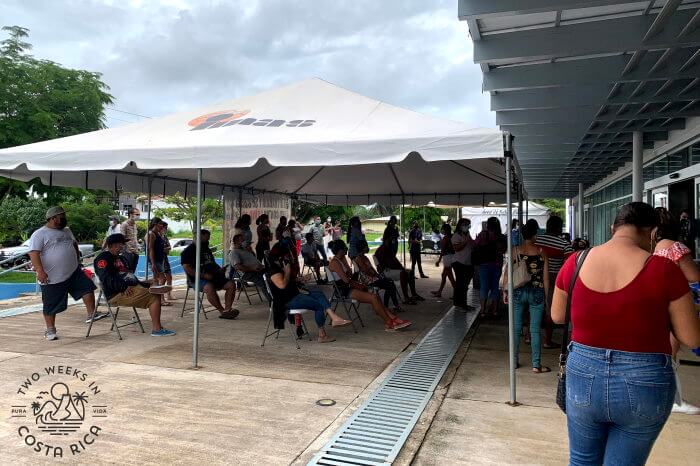
Last Updated: February 11, 2022
Have a question about Covid vaccination rates in Costa Rica? Ask us below.
Looking for more information about traveling to Costa Rica during Covid? Check out these posts.
Costa Rica and the Coronavirus: Get detailed, current info on Costa Rica’s current Covid numbers and restrictions.
Traveling to Costa Rica During Covid-19: Learn about the health pass you’ll need to fill out and details about travel insurance requirements.
Where to Get a Covid-19 Test in Costa Rica: If you need a Covid test to get back home, this post gives the testing sites throughout the country.
